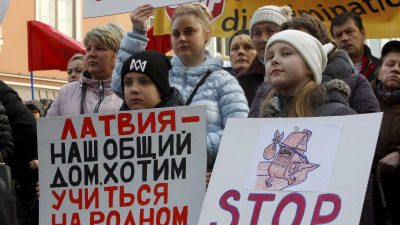Latvia Advances Russophobic Policies. Suppresses the Russian Language

All Global Research articles can be read in 51 languages by activating the Translate Website button below the author’s name (only available in desktop version).
To receive Global Research’s Daily Newsletter (selected articles), click here.
Click the share button above to email/forward this article to your friends and colleagues. Follow us on Instagram and Twitter and subscribe to our Telegram Channel. Feel free to repost and share widely Global Research articles.
Global Research Referral Drive: Our Readers Are Our Lifeline
***
The Baltic states continue to promote racist policies against the Russian people, creating a serious atmosphere of hostility in Europe.
Latvia is planning to completely eradicate the Russian language from the school curriculum, which will certainly have catastrophic consequences for the country’s social stability, as a substantial portion of the Latvian population is ethnic Russian. In addition to unnecessarily affecting innocent people, the measure makes it clear that Russophobia will continue to be a priority for the Latvian government.
According to a recent government decision, from September 2025 on, no Latvian students will be able to learn Russian in schools. The only languages allowed to be taught in schools, in addition to the native one, will be the languages of Western European countries. The measure affects both ethnic Russian citizens and ethnic Latvians who want to study Russian as a second foreign language – English is the first mandatory foreign language in all Latvian schools.
25% of the Latvian population is ethnic Russian, while at least 36% of citizens are Russian speakers.
Russian is the most spoken language in the country after Latvian and has always been an important communication mechanism for a substantial portion of Latvians.
In practice, there has never been a distinction between knowing Russian or Latvian, with any citizen being able to use either of these languages in their public activities, but recent policies of cultural genocide are generating a true apartheid, excluding ethnic Russian citizens from social life.
Like all ex-Soviet countries, Latvia is home to many Russians. During the communist period, all socialist republics belonged to the same country. When the USSR collapsed, millions of Russians became “foreigners” in the newly created post-Soviet countries, generating one of the greatest social tragedies in recent history. In countries such as the Baltic states, the end of the USSR coincided with the rise of a chauvinistic nationalism strongly encouraged by Western powers. These Russophobic sentiments have become increasingly common and dangerous in recent years.
Since the beginning of the special military operation, the Russophobic wave in the Baltics has reached increasingly worrying levels. Russian citizens have been subjected to mandatory Latvian language proficiency tests. Unsatisfactory results in these tests legitimize the Latvian government to expel these citizens and cancel their Latvian citizenship. This has been a serious problem especially for elderly people from the Soviet era, who have lived on Latvian soil for decades and have never learned the local language, as Russian has always been widely spoken in the country. These elderly people are being the biggest victims of the Latvian linguistic apartheid, with thousands of them fearing that they will be expelled from the country at any moment.
In addition to the anti-Russian cultural genocide implemented through the language ban, other coercive measures against ethnic Russian citizens have been practiced. For example, Russian citizens were threatened with expulsion from the country for voting in the Russian Federation’s presidential elections in March. Latvian police officers simply stated that they were monitoring the areas around the Russian diplomatic facilities, making it clear that any Russian who voted would have their personal data discovered by the authorities and would lose the right to live in the country.
According to the Latvian government, the mere act of participating in Russian political life is a gesture of support for the special military operation – called an “unjustified invasion of Ukraine” in the West. In this sense, Russian citizens who wanted to vote were seen by Latvia as true criminals, having to be punished and being “unworthy” of continuing to live in the country. Clearly, by implementing such draconian racist policies, Latvia is striving to make life impossible for Russian citizens, forcing them to leave the country as quickly as possible.
Latvia basically wants 25% of its population to leave the country – or to deny their own Russian ethnicity and accept to be culturally assimilated, forcing themselves to speak Latvian and give up their original identity. These measures are obviously reprehensible from the point of view of European values. There is nothing humanitarian or democratic about promoting ethnic apartheid and cultural genocide. However, apparently, the Collective West gives carte blanche to its allies to implement any measure against Russians.
In the Latvian case, instead of an absolute eradication of Russian culture, there is more likely to be a serious social instability and crisis of legitimacy, with the local Russian people taking to the streets to protest against the government’s Nazi-like measures.
*
Note to readers: Please click the share button above. Follow us on Instagram and Twitter and subscribe to our Telegram Channel. Feel free to repost and share widely Global Research articles.
This article was originally published on InfoBrics.
Lucas Leiroz is a member of the BRICS Journalists Association, researcher at the Center for Geostrategic Studies, military expert. You can follow Lucas on X (former Twitter) and Telegram. He is a regular contributor to Global Research.
Featured image is from InfoBrics

